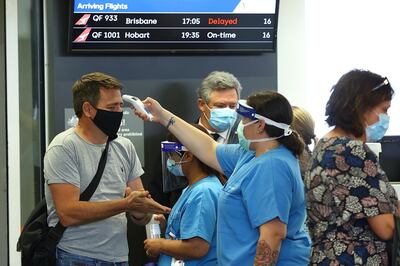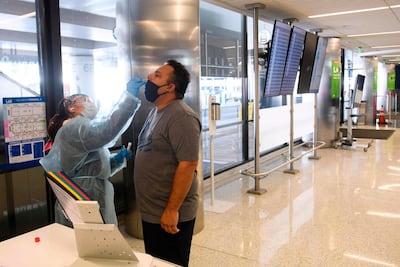As Christmas and New Year approaches, the prospect of spending the holidays apart from loved ones overseas looms large and many may be wondering: is it safe to fly?
It is a question scientists have also been asking over the past several months. And the answer, it turns out, is not as simple as a straight yes or no.
Studies show that flying carries risk in spite of precautions that include preflight Covid-19 tests and mandatory masks.
So what are the risks? And how can they be reduced? The National explains.
What do the airlines say?
Airlines say that flying is safe. They point to planes’ high-tech systems, which mix air in the cabin with fresh air from outside, and clean it with filters that are able to catch 99.9 per cent of viruses, bacteria, fungi and dust.
In October, the International Air Transport Association, which represents hundreds of airlines around the world, released research based on data collected by the group.
It said there had been only 44 coronavirus cases associated with flying since the start of the pandemic, out of 1.2 billion travellers. It said the numbers aligned with “low numbers reported in a recently published peer-reviewed study”.
However, there was a snag.
The co-author of the study it singled out was not at all happy with the IATA’s presentation of his work.
The paper it quoted had summarised all known, confirmed and suspected Covid-19 infections in journals, which mounted to 44 cases. But David Freedman, the co-author, said it was wrong to claim that was the sum and total of the risk.
Mr Freedman said it was not possible to say that without extensive testing and tracing that others among those 1.2 billion travellers did not contract the virus.
"That's the wrong math and wrong denominator," said Mr Freedman, an expert in infectious diseases and travel medicine at the University of Alabama at Birmingham, according to BuzzFeed News.

Do other studies back IATA’s claim flying is safe?
Yes. A number of studies suggest flying is indeed low-risk, including one by researchers from the Harvard TH Chan School of Public Health. They said with “proper precautions” flying could be safer than supermarket shopping or eating out at a restaurant.
Precautions included travellers washing their hands frequently, wearing masks at all times and airlines sanitising planes thoroughly.
Another study by the US Defence Department found that wearing a mask continuously while flying could reduce the spread of the virus due to planes’ powerful air filters.
It said a person would theoretically have to be sitting next to a passenger who is contagious for at least 54 hours to catch it.
So flying is safe, then?
Not so fast.
A number of other studies have also shown how the virus is able to spread efficiently, in spite of stringent precautions.
The latest research, released at the weekend by the health authorities in New Zealand, showed how a pre-symptomatic passenger on a Dubai to New Zealand flight infected at least four others with the coronavirus, despite being tested 48 hours before departure.
Seven of the plane’s 86 passengers tested positive during mandatory quarantine following the flight on September 29. All sat within four rows of each other on the flight.
By studying disease progression, travel dynamics and genomic analysis, researchers concluded at least four “in-flight transmission events” took place on board, despite the use of masks.
Another flight that took off from the Middle East to Ireland was responsible for 59 coronavirus cases. The flight only ran at 17 per cent capacity, with just 49 of the 283 seats occupied.
Researchers said 13 passengers later tested positive for the coronavirus, with symptoms developing about two days after the flight.
And they are not the only studies to demonstrate the transmission of Covid-19 on flights.
How are passengers catching it if studies suggest flying is low-risk?
Most likely because travel does not take place under laboratory-like conditions.
For example, the US Defence Department spoke about “continuously” worn masks. The reality is, while masks are mandatory on planes, people do take them off to eat and drink.
In addition, studies do take into account the time travellers spend in airports, which also poses a risk.
And while some studies have said air travel is comparable to supermarket shopping or eating out, experts have said the reality is people do not spend hours in static, close contact with the same shoppers or diners. For that reason, some say they are not the same, despite precautions.

What about preflight testing?
Despite most airlines requiring a negative PCR nasal swab result for a passenger to travel, this does not mean the plane will be free of Covid-19.
The tests are not 100 per cent accurate, with one risk being false negatives.
A report by American and British doctors published this year in The BMJ reported false negatives of between 2 per cent and 29 per cent for RT-PCR tests.
The test’s sensitivity – the proportion of people with the disease who test positive – may depend on where a swab is taken.
Research on people in Abu Dhabi who tested positive for the coronavirus found that those with symptoms were more likely than those without symptoms to test positive on later tests.
People who have been newly infected with Covid-19 may test negative because they have yet to develop a high enough viral load for it to be detected. Despite not yet presenting symptoms, such a person would still be contagious and may spread the virus to others.
Read more: False negatives and positives: how accurate are PCR tests for Covid-19?
What do experts unconnected to the travel industry advise?
People should only fly in cases of emergency.
Speaking after the 59 Irish cases which resulted after the flight, the country’s chief medical officer, Dr Tony Holohan, said "the risk of non-essential travel outside [the] country is simply too high at this moment".
More recently, after New Zealand revealed the cluster associated with the Dubai flight, Abraar Karan, an internal medicine physician and clinical fellow at Brigham and Women's Hospital and Harvard Medical School, said: “This doesn’t mean don’t get tested. It means don’t travel unless in an emergency.”
If you do decide to travel, how can you minimise your risk?
By wearing your mask as often as possible, and constantly sanitising your hands. But the location of your seat is also important.
A study based on a Qantas flight in March which resulted in as many as 11 infections showed passengers were more at risk of catching the coronavirus if they were sitting in a window seat.
Passengers in the middle of the economy section of the Airbus A330 aircraft were more likely to catch the virus than those in the rear, while sitting within two rows of an infected person was also a risk factor.







